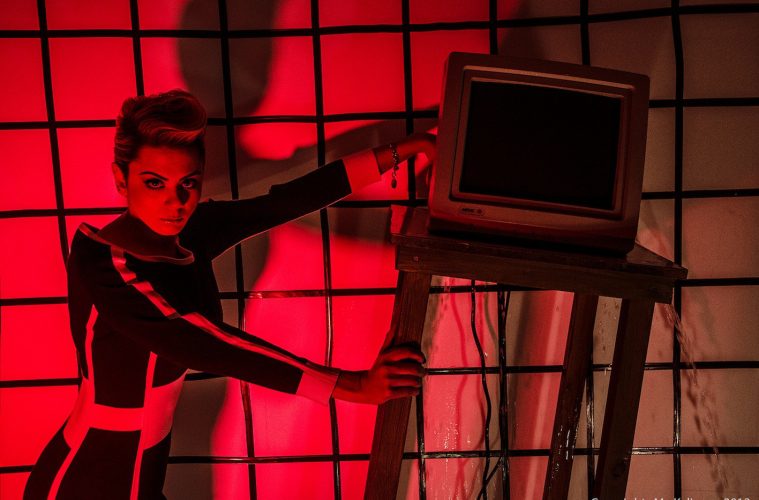Article by Aysha El-Shamayleh
Sitting editor: Eliza Marks
Photographs by Raneem Al-Daoud
Styled, art directed, digital art-work by Khalid Abdel-Hadi
Set design by Ala’a S. and Raneem
Hair by Mahmoud Karajogly
Make-up by Nada Al-Agha
Making-of video (mini-film) by Ala’a Abu Qasheh and Mustafa Rashed
Water is an excellent conductor for an interconnected system that distributes electricity. You can become a part of an electric path intro the ground just by touching it at the right time.
Have you been electrified by her, too? Monochrome, the 1960s lines, and checks! Her online presence give you access to an indefinite sphere system marked by straight-lines, so tempting to touch! She’s no less than a framework of mesh, water-wired, both off the grid and online. Roba Al-Assi is one fine geometry cut by crossing lines! My.Kali seeks to portray this beauty with an un-pixelated vibe.
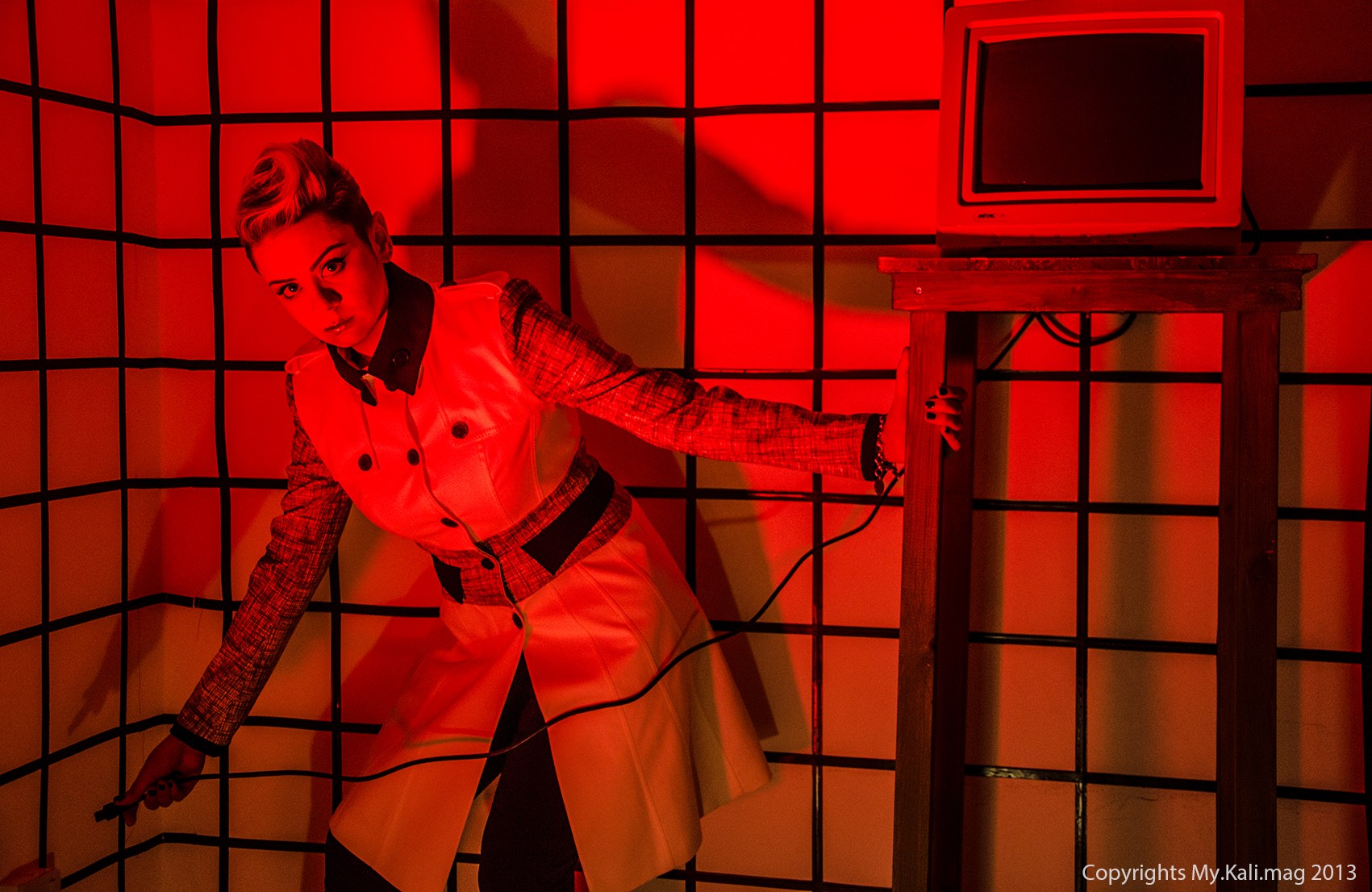
Long coat with grid detailing, black pants, both Karen Millen. Converse charm-bracelet and earrings worn throughout the shoot, Roba’s own.
She was one of the first Ammanis to break through a door, and fling Jordan wide open into cyberspace. My.Kali sought her out in search of Amman, the offline and the online city.
Having spent her childhood in the American compounds of Riyadh, Roba Al-Assi did not find herself in Amman until the age of nineteen. She felt stranded, somewhere outside her comfort zone, and confronted with an unfamiliar reality. This prompted her to wander into the digital sphere in search of similar minds.
Roba founded her blog, AndFarAway, in 2004, back when uploading a picture online was a tedious process. “It took ages,” she told me. There were only about five bloggers in Amman, and the virtual scene was young and limited to tech connoisseurs. The group of young bloggers were the first to arabize the word “blog” into “mudawaneh.” Now, blogging is abundant and blogs have a reputation for short lifespans, and it is quite impressive that AndFarAway is still standing. The digital dossier has seen Amman evolve over a span of nine years. She is a feminist, tech expert, writer and social butterfly, but prefers to introduce herself, saying, “Hi, I am Roba, and I am from the Internet.”
When the My.Kali team approached me about writing the feature, I imagined I would be interviewing a tech geek, a shy in person who would look back at me through thick smudged glasses, saving her explosive personality for the blog only. Roba’s blog did say the World Wide Web was the love of her life. That was the stereotype that I, for some odd reason, associated with web aficionados. Bear in mind that I’m a poet who still romanticizes about handwriting on the back of postcards and typewriters. I’m my own kind of nerd, and technology terrifies me. After a long conversation with Roba about her favorite alter reality, it was clear that her passion for people, love for escapism, and articulations about recent changes in the Jordanian cyber community, and my stereotype was proven wrong. I believe the relationship between offline and online Amman is personified by this seasoned blogger, and I believe that Roba gives an great insight into our generation’s perspectives on the world, and, more specifically, an ever-evolving Amman.
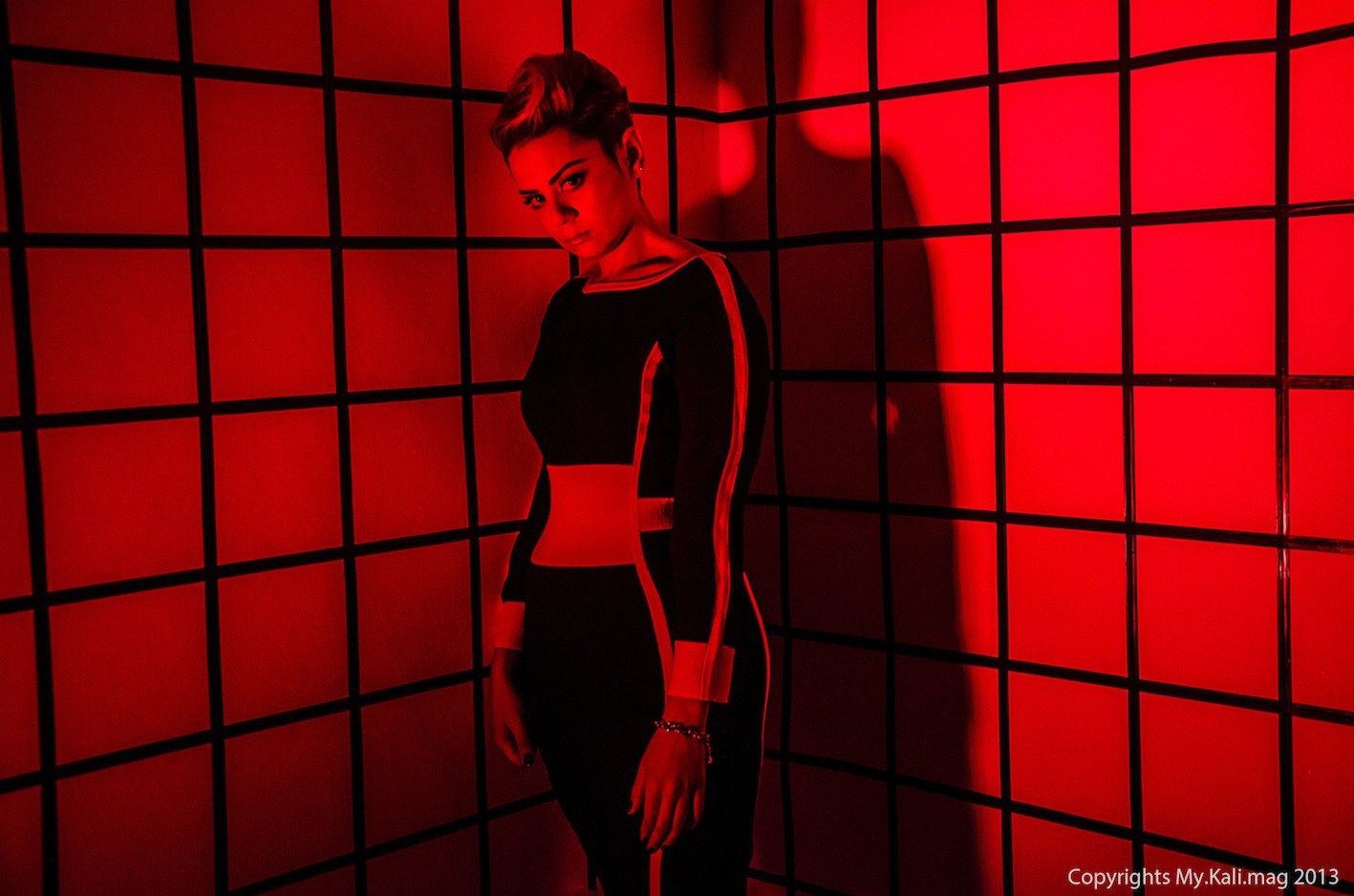
black and white stretch grid dress, Karen Millen. Converse charm- bracelet worn throughout the shoot, Roba’s own.
When you started blogging back in 2004, you were 19 years old, and you were one of the first bloggers in the region. What made you start, and how has your blog evolved since your teenage years?
I created AndFarAway in 2004 as a personal space for creative thought. I had just finished my first year as a Fine Arts and Design student, and my mind was full to the brim with colors, images, and concepts. I initially started blogging because I needed a place to sort of “store” anything that inspired me, and blogging was, and still is, the perfect tool. To put 2004 in perspective, that was several years before Twitter, Facebook, and YouTube came to be. There weren’t many spaces available online. It was a different world then. It was a world in which Iraq was just messed up by America. The Amman bombings still hadn’t happened yet, and you didn’t have to go through security to enter every single venue in town. Abdoun bridge was under construction. George Bush was just re-elected. Rainbow Street had a total of two places; Al-Quds Falafel and Batata, (Books@ wasn’t as popular as it is now). Dubai was still nothing. There was a lot to think of that year, and I captured it all on my blog.
Around 2006, an Arab blogging community emerged and, as a result of my interaction with other bloggers (both on a local and regional scale), the space became more personal. A lot of times I covered social issues we face in the Arab world that I have strong opinions about. I cannot possibly tell you about all the wonderful, brilliant, and inspiring people who I’ve met through my blog. In 2008-2009, I lost my interest in personal blogging and shifted to blog mostly about design, technology, internet culture, and gadgetry.
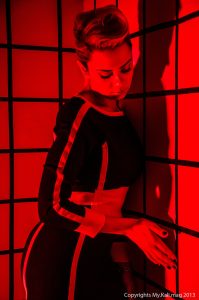
black and white stretch grid dress, Karen Millen. Converse charm- bracelet worn throughout the shoot, Roba’s own.
Bloggers are often stereotyped as antisocial isolated geeks. How true is that in your case? How do you make sure you’re still in touch with the offline Amman?
Are we really stereotyped as that? I don’t think that’s the stereotype. Blogging is a tool, and some of the most famous blogs cover some really social topics, like gossip, for example. On a personal level, there isn’t anything antisocial about me. I actually draw my energy from meeting people and from being in loud, crowded places. Even on a blogging level, I first met bloggers and readers in 2004. I love meeting random people through the internet. They’re often so much more interesting than the ones I meet offline.
The stereotype that bloggers sit behind their screens all day doesn’t really work, either. I’m never behind a screen unless I’m at work. I often blog on the go (smartphones five years after I started my blogging career), or in dead time at home while getting ready to go out. I also use my pencil and notebook a lot, transcribing later.
Why did you choose to use a pair of red Converse shoes to represent your brand on the Web?
In 2004 when I chose that avatar, Converse shoes were REALLY uncool, and not just in Amman. I chose them because they represented a concept that to me was laid-back, take-it-as-you-go, anti-fashion-thinking, and part of an embodied reality (as opposed to the disembodied digital). I like walking around Amman a lot. In the beginning, my blog was all about walking in Amman, taking pictures, sharing my thoughts and experiences in the city. Maybe that’s why there’s little difference between the digital me and real me, because they clashed in the beginning. I love the Web with every bit of my heart and soul, but I majored in Fine Arts, something that’s very connected to physical sensations and raw ingredients. The red converse represent that. I love the Web. I am of the Web. Yet, my deep love of the Web doesn’t mean that I’m not grounded outside my screen. I have my feet firmly planted on the mountains, the asphalt, the bar floors, the galleries. I’m walking myself through both, removing the borders.
Many people believe the field of technology is a man’s world. What obstacles, misperceptions and challenges did you face as an Arab female blogger?
Technology is a man’s world, but I didn’t really face any challenges aside from comments by the occasional ignorant person who thinks that having a member between his legs entitles him to tell me how I should live my life. Maybe I haven’t faced any challenges because I choose to ignore the very existence of these challenges. My parents taught me that I could do anything I want, so I do just that.
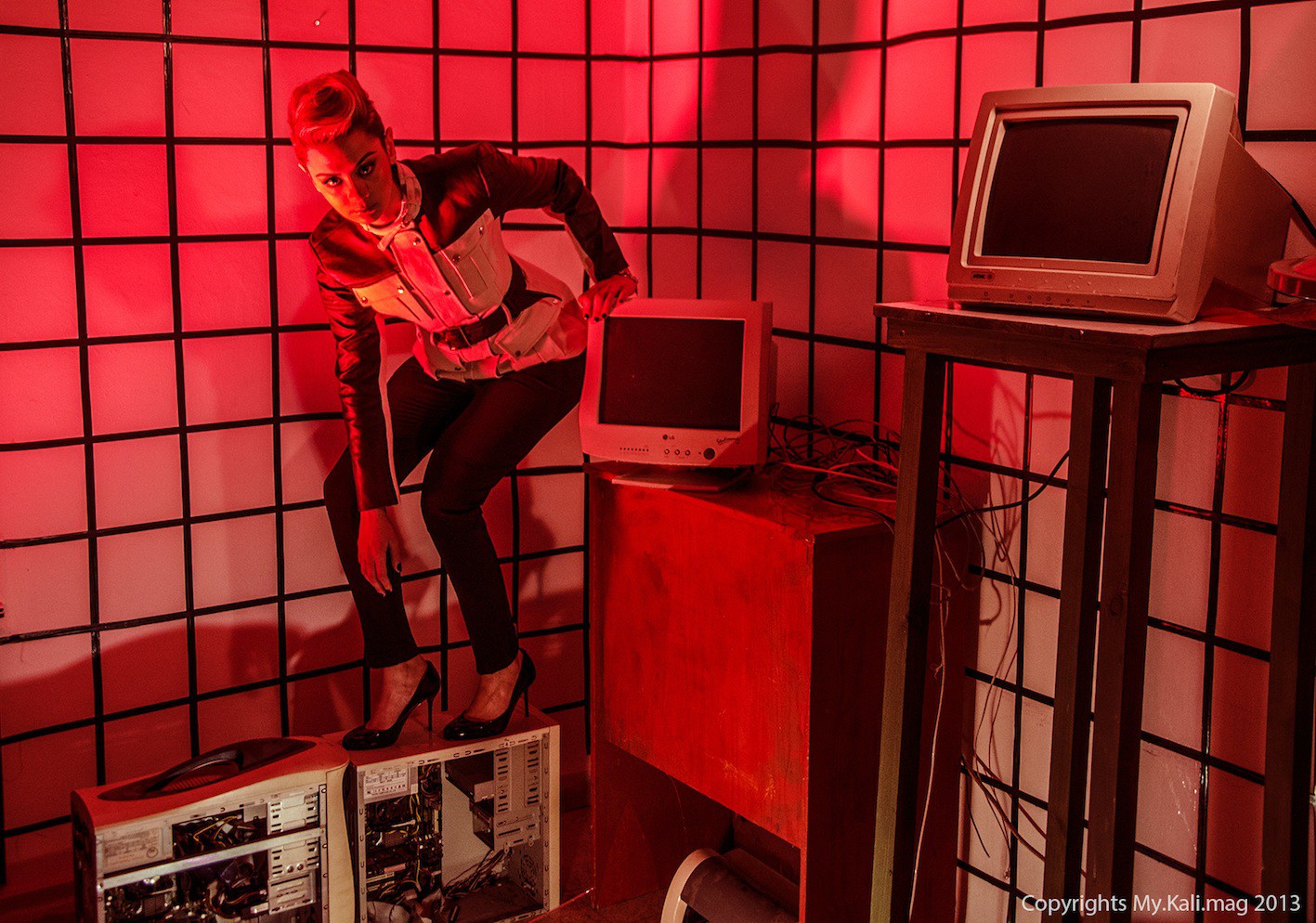
Mixed leather jacket with black pants and black patent leather heels, all Karen Millen. Converse charm-bracelet and earrings worn throughout the shoot, Roba’s own.
Blogs are notorious for their short lifetimes, yet your blog has been around for more than 9 years now. What keeps you going?
My blog is my baby. It’s like an art project to me. A book. A part of my soul. In 2005, here’s what I said about the occasion of its first anniversary: “It’s all recorded, it’s all archived, it’s all documented. It can be played, over and over again. It’s me, it’s mine, but the truth is, once I press Publish, those little pieces of myself that formed intelligible sentences are now on the journey of forever- forever attributed to me, forever belong to the World Wide Web… How long I’m going to do it for, how long will it continue to serve as a void deficient of functional limits and realistic boundaries, I do not know… At the moment though, this is my canvas- devoid of reality, devoid of rules, and devoid of people who insist on making the walls purple. And I do it because I love it.”
My blog is my partner. Through friendships. Through loves found. Through health. Through growth. Through first jobs. Through joy. Through things that change the world. Through deaths. Through college. Through self discoveries. Through lots of coffee. Through career changes. Through depression. Through fresh starts. Through sickness. Through obsessions. Through loves lost. Through addictions. Through revolutions. Through good conversations. Through boredom. Through technological milestones. Through pain. Through Amman. It’s been a while, somehow. Yet, it seems like yesterday that I celebrated its first birthday. But it wasn’t yesterday. It was nine long years ago. It was a different lifetime. A different me. A different you.
You are one of the first Jordanian bloggers. What was the online Amman scene in its beginning, and how is it now?
We were about 5 bloggers or something then. A blogger found my blog a week after I started it. It was such a rare occurrence that it was news… someone joined the cult of five people. She commented on a photo of Amman, saying that she was ready to see some photographs of Amman, as she really misses it. I felt like I did a good thing for someone by making them feel a small amount of pleasure, and so I blogged some more. This had a snowball effect. My blog was then added to Jordan Planet, an aggregator that existed at that time, and I discovered the community-feel of blogging. My blogging friends of those years changed my life. They took me in, this random bunch of Jordanian bloggers whose ages ranged from 19 to 45 that lived all around. We had the first Jordanian blogger meet-up in the winter of 2004, which took the blogging experience offline.
Many of us became really good friends, and I am still good friends with bloggers I met back in those early years. Then blogging came popular, and Jordan Planet became bigger. I became a part of Toot, the first Arab blog aggregator. When blogging became too popular, and Jordan Planet shut down. Other aggregators were attempted but I think the blogging trend died in 2009. People would rather read Twitter updates; They’re shorter. These days, people in Jordan also seem to believe that the Internet has magical abilities that can make you filthy rich. This, I would like to point out, is a myth. Yes, if you work hard, passionately, and intelligently, you can make good money from the Internet by adding value.
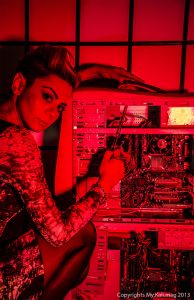
Graphic shift dress with sheer detailing, Karen Millen. Converse charm-bracelet and earrings worn throughout the shoot, Roba’s own.
Blogging is often recognized as a form of escapism. Is that true in your case?
I don’t think it’s commonly recognized as that at all. In my case, I can easily say that blogging was the best thing that ever happened to me. It has affected my life in every single possible aspect, from the big things such as my career and the man I want to spend the rest of my life with, to the little things like how to use Photoshop and where to go tomorrow morning. It introduced me to so many people who literally changed the course of my life, in both wonderful and not so wonderful ways, and some of whom have become my closest friends or just taught me a lot. It gave me many amazing experiences. This is a space that has become an essential part of my life during the past nine years, a space I have come to love with all my heart and my soul. This is a place that has taught me about life, been there for me when I was in need, and gave me so many opportunities that I would have never dreamt of having. You see, And Far Away has long ago stopped being just a blog, and became a living, breathing entity.
That said, I think writing (not blogging) is definitely a form of escapism for me. I’m a girl who has always found refuge by hiding behind my books. When my dad died, I did nothing but read. Escapism is best served with words. Words have the power to do and undo. Words have the power to give you strength. Words have the power to help you let go. End of chapter. End of story. New book starts now.
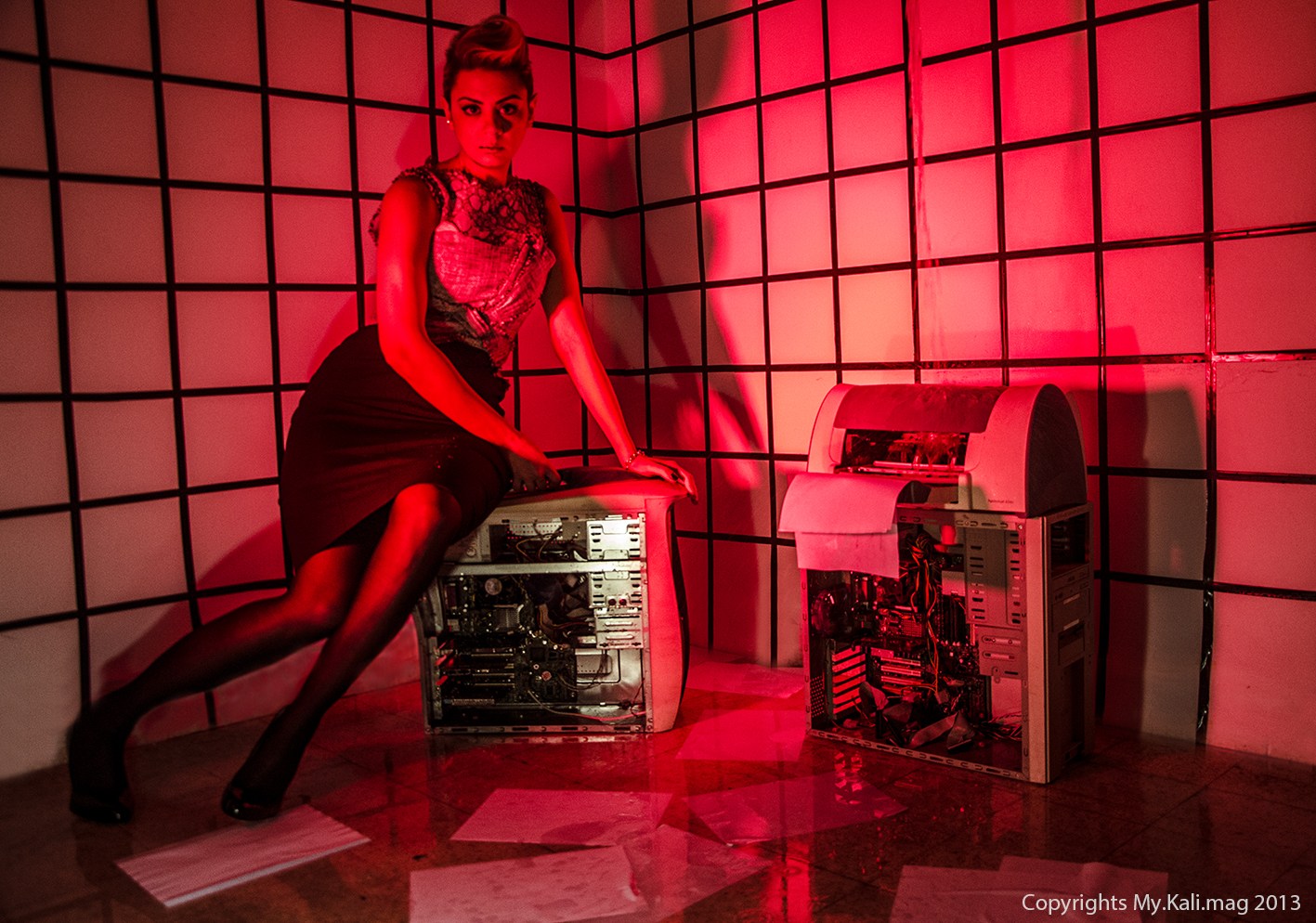
Sleeveless dress with grid detailing, patent leather heels, all Karen Millen. Converse charm-bracelet and earrings worn throughout the shoot, Roba’s own.
What is your idea of a Ammani utopia?
A walled-off, large commune that starts on the beginning of the rainbow and ends on the Third Circle, with an algorithmic system of who gets accepted into the commune.
“I think I should be judged for the person I am, and not my gender. We live in a society that inherently hates women, sexualizes them, hides them, is embarrassed by them, is afraid of them, is demeaning to them.”
Tell us, how can someone be happy in Amman?
Great question. I think I discovered the secret to happiness is systems. Systemize your life, your thoughts, and your expectations. Once you have a framework or system to work with, you can spend every moment of your life taking your pleasure seriously.
(1) Always keep in mind that you are much smaller than life, and thus your life doesn’t really mean anything. (2) Remember that nothing beyond your now and your near tomorrow matters; we will all die. Live your life. (3) Bubbles are beautiful. Nourish your bubble and grow it. (4) Happiness lies in two things: curiosity and amusement. Look at all moments in life no matter how prosaic with these two things and you shall live happily. (5) Love deeply. Love your job. Love your friends. Love the smell of the air. Love the places you frequent. Love your family. Love makes a difference. (6) The best way to deal with nakad is to exterminate it. Even if the cause is a person you love. Nakad is contagious. Exterminate all causes, instantly. (It’s hard to translate nakad for those of you who don’t speak Arabic, but it roughly means “gloom”). (7) Most things won’t matter a year from now, but you will be a year older, so don’t let things matter now either. (8) Just say yes. I know you don’t want to, but do it. Say yes. (9) Think critically. Over 90% of what you’re told is B.S. (10) Do what you feel like doing: occupy your present.
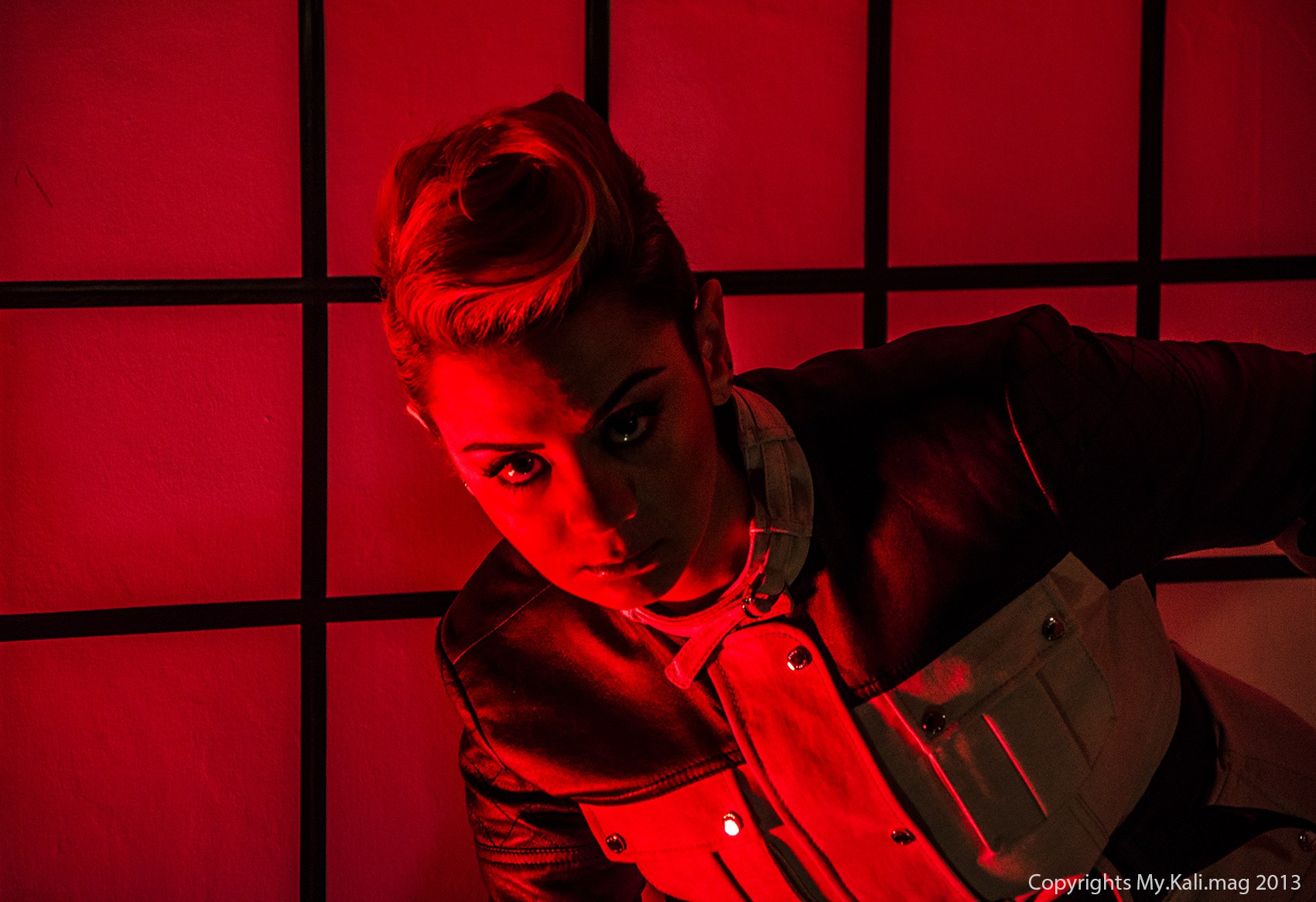
Mixed leather jacket, Karen Millen.
Who are 6 people you must meet in Amman?
Rula Al-Assi, my awesome mother (YouTube her), Ahmad Humeid of Syntax (and he has one of the oldest blogs in town), Raed Asfour of Masrah AlBalad, Toleen Touq, a very fascinating person, Tareq Abu Kwaik of band El Far3i-الفرعي, another very fascinating person, and The JoBedu guys .
In what ways has blogging influenced your life and your evolution as a human being?
When I think of this, I think of blogging, the Internet, and technology as a single entity. You see, it might sound crazy, but I believe that I can actually talk to technology. I believe that I can feel it, understand it, love it. For the Internet in particular, I see the Web as a living, growing, breathing creature, of which my blog is just a part of. AndFarAway is a part of me, but it’s also a part of the Web, and maybe that’s why I can speak to the Web. I mean, I grew up in the compounds of Saudi Arabia, where the world is nothing beyond best-selling pulp fiction and sh*tty American drama. Information was not available to due to censorship, lack of choice, or in-affordability. Fortunately, I had the Internet. I read, and read, and read. I downloaded books and PDFs. I got to learn the world through websites, through links, through files downloaded on mIRC. The Internet is why I am who I am today. It is how I learned to design. It is how I learned to write. It is how I learned to code. It is my livelihood.
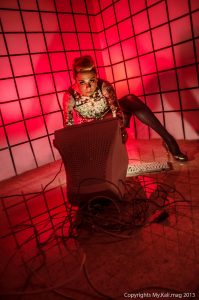
Graphic shift dress with sheer detailing, Karen Millen. Converse charm-bracelet and earrings worn throughout the shoot, Roba’s own.
You expressed earlier your fascination with androgynous fashion? You quiet looked the part on our #Amman issue cover, so how does being neither distinguishably masculine nor feminine appeal to you?
I think I should be judged for the person I am, and not my gender. We live in a society that inherently hates women, sexualizes them, hides them, is embarrassed by them, is afraid of them, is demeaning to them. I don’t want to be lumped as that. I live my life without my gender being a factor in anything I do. Don’t misunderstand me, I love being female, but I think that me being male or female is completely irrelevant to who I am as a person.
What is your opinion about same sex marriage?
My opinion is that everyone should be equal in the eyes of law. Sexual preferences is a personal decision and it shouldn’t be anyone’s damn business.
You identify as a queer ally. Do you think it is easier to live as a straight woman, or a queer woman in Amman?
I think that being gay in Arabia is probably not as difficult as it could be, given how taboo cross-gender relationships are. Is it easier? Maybe in some instances it’s easier to hide being in a lesbian relationship and spend much more time with romantic interests because it could be packaged as safe friendship. But maybe not at the same time, because our society is closed minded.
- Read Roba’s blog entry on her experience with My.Kali’s shoot and check out some of behind the scenes images (here)
- Watch My.Kali’s mini-film of Roba’s ‘Don’t Crisscross her or…’ below:

